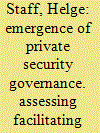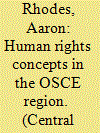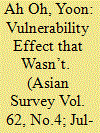|
|
|
Sort Order |
|
|
|
Items / Page
|
|
|
|
|
|
|
| Srl | Item |
| 1 |
ID:
155817


|
|
|
|
|
| Summary/Abstract |
Facing the threat of Somali piracy, private actors have created a private security governance framework by both issuing and implementing standards as well as offering operative security solutions through armed guards. Which conditions have facilitated this provision of private security? The present article approaches this research question in two innovative ways: Theoretically, by deriving four conditions from the literature on private climate governance and applying them to the security realm; and empirically, by analyzing the activities of Private Military and Security Companies and the shipping industry in the case of Somali piracy based on a series of semi-structured interviews. Thus, the article contributes to the literature on private security in at least two ways: it provides an extensive understanding of private security incorporating operative and regulative elements and it uses insights about private governance from a more developed field in order to understand private security governance more systematically. The article concludes that all four conditions prominent in the literature on climate change – risk perception, involvement of capital markets, governmental inability, and commodification – can successfully be applied to the case of Somali piracy and explain the emergence and dynamic of private security governance.
|
|
|
|
|
|
|
|
|
|
|
|
|
|
|
|
| 2 |
ID:
153706


|
|
|
|
|
| Summary/Abstract |
The Helsinki Accords resonated with dissident movements in the Soviet Bloc that had reconstructed a classical liberal approach to human rights. Human rights campaigns on both sides of the Iron Curtain emphasized civil and political rights. But human rights revisionism, expanding the scope of human rights, was growing in international institutions. In 1993, the international community embraced the concept of the ‘indivisibility’ of human rights. An expansive, ‘post-modern’ vision of human rights de-emphasized the protection of basic individual freedoms, while expanding global regulation. A strong moral and political challenge to classical human rights has emerged in the form of Eurasianism, a statist doctrine that denies the existence of universal human rights and insists that each culture has its own values. The idea of human rights as protections for basic freedoms, diluted and weakened over decades by assaults and compromises, may lack the moral clarity needed to confront the Eurasian challenge.
|
|
|
|
|
|
|
|
|
|
|
|
|
|
|
|
| 3 |
ID:
186409


|
|
|
|
|
| Summary/Abstract |
In response to the outbreak of a new viral infection in the early weeks of 2020, some countries imposed strict entry restrictions on visitors from China, while others opted for less stringent measures. Among the explanations for such variation, this study is focused on the argument that a country’s economic dependence on China, particularly via trade, affected its decision. This economic vulnerability argument posits that countries highly dependent on China for trade avoided imposing a ban because it might have caused (1) primary economic losses from trade disruptions and (2) secondary economic losses from Chinese sanctions. I empirically test this argument using an original data set on entry restrictions on China. The findings do not support such a hypothesis. Using the nonconforming cases of Japan and South Korea, I speculate that country-specific factors, which tend to be idiosyncratic and political, may have played a role.
|
|
|
|
|
|
|
|
|
|
|
|
|
|
|
|
| 4 |
ID:
164487


|
|
|
|
|
| Summary/Abstract |
The paper challenges the notion that Chinese maritime coercion in the East and South China Seas (ESCS) is best described as a grey zone strategy. The ‘grey zone’ notion raises two issues. Conceptually, it adds little to the existing literature on maritime coercion. Practically, it creates confusion over the understanding of maritime coercion by blurring the distinction between military and constabulary activities. The paper articulates this difference to elucidate the functional correlation between Beijing’s strategic objectives and maritime claims. Within this context, the grey zone construct is particularly problematic since it uncritically assumes that the use of force is designed to remain below the threshold of war. By contrast, the paper argues that Chinese maritime claims to control ‘rights and interests’ are a function of a broader strategic intention to project military power within and beyond the confines of the ESCS, whilst preventing others to do the same. Thus, Chinese maritime coercion (military and constabulary) increases strategic competition and the risk of war, and is therefore better described as part of a ‘hybrid’ strategy.
|
|
|
|
|
|
|
|
|
|
|
|
|
|
|
|
|
|
|
|
|